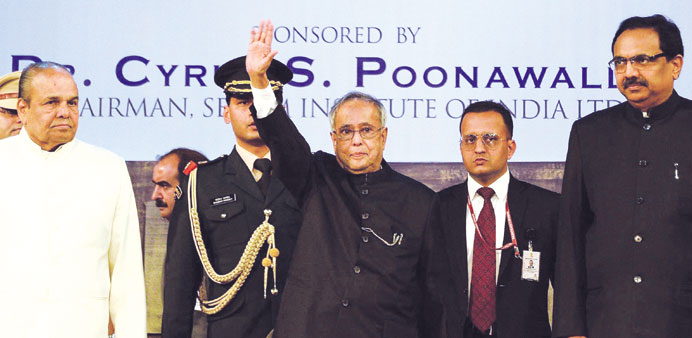President Pranab Mukherjee gestures as Maharashtra state Governor K Shankarnarayanan (left) and others look on during the inauguration of the tenth World Zoroastrian Congress in Mumbai yesterday.
AFP/Mumbai
One of India’s wealthiest businessmen urged his fellow Parsis yesterday to take risks to stay successful and come up with solutions to a demographic crisis which threatens the community’s survival.
Billionaire businessman Cyrus Poonawalla, chairman of the four-day World Zoroastrian Congress, told young Parsi delegates that they should follow in the footsteps of their forebears, who forged one of the world’s most successful business communities.
“Most of our Parsi youth are taking white collar jobs, not only in India but abroad. The result you see is that there are a lot of industrial houses that are dwindling rather than growing,” said Poonawalla at the opening of the conference in the Parsis’ spiritual home of Mumbai.
He recommended that youngsters “take some risks, take some initiative, somehow get into a small business first and then grow it up”.
Many of the world’s Zoroastrians — followers of one of the oldest religions — descend from Persians who fled to India to escape persecution more than 1,000 years ago and became known as Parsis.
They later became closely linked with the rise of financial capital Mumbai.
Several of India’s top industrialists are Parsis, such as the Tata and Godrej families, while the late Queen singer Freddie Mercury was the son of Parsi migrants to Zanzibar.
Poonawalla founded the Serum Institute of India, one of the world’s biggest vaccine-makers.
Forbes rated him as India’s 16th richest man this year with a net worth of $4bn.
Despite their successes, the Zoroastrians, who hold a global conference every four years, face a demographic crisis as their population rapidly diminishes.
“There are many challenges facing our community, our dwindling population being one of them,” said Poonawalla, adding that he hoped congress talks could come up with “practical solutions” — although he admitted it was a “controversial” matter.
Parsis are divided over how best to preserve their identity, which currently combines religion with ethnicity and is passed down only through the male line.
Some would like to see a more liberal approach to women who marry out, while traditionalists say intermarriage will bring an end to the tiny group’s ethnicity.
India’s government, keen to sustain the community, is launching an IVF scheme for the Parsis, who tend to marry late —or not at all — and opt for smaller families.
The theme of the congress, the first in Mumbai since 1990, is “Nurturing Growth and Affirming Identity”, with discussions including “Demography and Way Forward: Issues of Fertility and Solutions” and “The Zoroastrian World — a Demographic Picture.”

